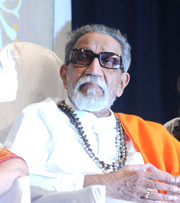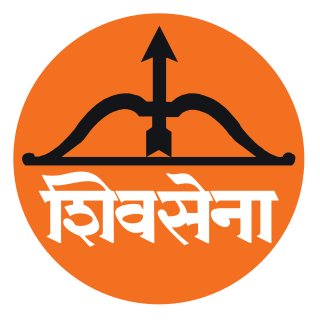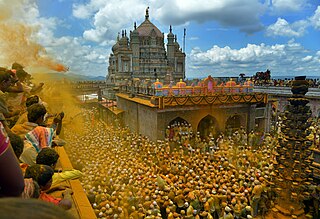Related Research Articles

Bal Thackeray, was an Indian politician who founded the Shiv Sena, a right-wing pro-Marathi and Hindu nationalist party active mainly in the state of Maharashtra.

Mumbai is the capital city of the Indian state of Maharashtra and the de facto financial centre of India. According to the United Nations, as of 2018, Mumbai is the second-most populous city in India after Delhi and the eighth-most populous city in the world with a population of roughly 2 crore. As per the Indian government population census of 2011, Mumbai was the most populous city in India with an estimated city proper population of 1.25 crore (12.5 million) living under the Brihanmumbai Municipal Corporation. Mumbai is the centre of the Mumbai Metropolitan Region, the sixth most populous metropolitan area in the world with a population of over 2.3 crore. Mumbai lies on the Konkan coast on the west coast of India and has a deep natural harbour. In 2008, Mumbai was named an alpha world city. It has the highest number of millionaires and billionaires among all cities in India. Mumbai is home to three UNESCO World Heritage Sites: the Elephanta Caves, Chhatrapati Shivaji Maharaj Terminus, and the city's distinctive ensemble of Victorian and Art Deco buildings designed in the 19th and 20th centuries.

Maharashtra is a state in the western peninsular region of India occupying a substantial portion of the Deccan Plateau. Maharashtra is the second-most populous state in India and the second-most populous country subdivision globally. It was formed on 1 May 1960 by splitting the bilingual Bombay State, which had existed since 1956, into majority Marathi-speaking Maharashtra and Gujarati-speaking Gujarat. Maharashtra is home to the Marathi people, the predominant ethno-linguistic group, who speak the Marathi language, the official language of the state. The state is divided into 6 divisions and 36 districts, with the state capital being Mumbai, the most populous urban area in India, and Nagpur serving as the winter capital, which also hosts the winter session of the state legislature. Godavari and Krishna are the two major rivers in the state. Forests cover 16.47 per cent of the state's geographical area. Out of the total cultivable land in the state, about 60 per cent is used for grain crops in the Deccan region, rice in coastal Konkan, and other high rainfall areas.

Shiv Sena is a right-wing Marathi regionalist and Hindu ultranationalist political party in India founded in 1966 by cartoonist Bal Thackeray. Originally emerging from nativist movements in Bombay, the party agitates for preferential treatment for the Marathi people over migrants from other parts of India. Its election symbol for Maharashtra is Bow and Arrow. Uddhav Thackeray, Bal Thackeray's son, is party leader and served as the Chief Minister of Maharashtra between 2019 To 29th June 2022.

The Gateway of India is an arch-monument built in the early 20th century in the city of Mumbai, India. It was erected to commemorate the landing of King-Emperor George V, the first British monarch to visit India, in December 1911 at Ramchandani Road near Shyamaprasad Mukherjee Chowk.

Samyukta Maharashtra Movement, commonly known as the Samiti, was an organisation in India that advocated for a separate Marathi-speaking state in Western India and Central India from 1956 to 1960.

Yashwantrao Balwantrao Chavan was an Indian politician. He served as the last Chief Minister of Bombay State and the first of Maharashtra after latter was created by the division of Bombay state. His last significant ministerial post was as the Deputy Prime Minister of India in the short lived Charan Singh government in 1979. He was a strong Congress leader, co-operative leader, social activist and writer. He was popularly known as Leader of Common People. He advocated social democracy in his speeches and articles and was instrumental in establishing co-operatives in Maharashtra for the betterment of the farmers. He is generally regarded as the architect of Modern Maharashtra.

Jejuri is a city and a municipal council in Pune district of Maharashtra, India. The town has an important mandir to the Hindu Lord Khandoba, the Khandoba Mandir on a hill in the town, is one of the most visited tirtha in Maharashtra.
Indigenous tribals have inhabited Mumbai (Bombay) since the Stone Age. The Kolis and Aagri were the earliest known settlers of the islands. The Maurya Empire gained control of the islands during the 3rd century BCE and transformed them into a centre of Hindu-Buddhist culture and religion. Later, between the 2nd century BCE and 10th century CE, the islands came under the control of successive indigenous dynasties: the Satavahanas, Abhiras, Vakatakas, Kalachuris, Konkan Mauryas, Chalukyas, Rashtrakutas, Silharas& Cholas.
The Ancient history of Mumbai recounts the history of Mumbai from 300 BCE to 1348 CE.
The history of Mumbai under Islamic rule began in 1348 and continued until 1534.
Barrister Abdul Rahman Antulay was an Indian politician. Antulay was a union minister for Minority Affairs and a Member of Parliament in the 14th Lok Sabha of India. Earlier he had been the Chief Minister of the state of Maharashtra, but was forced to resign after being convicted by the Bombay High Court on charges that he had extorted money for a trust fund he managed.

Khandesh is a geographic region in Central India, which includes parts of the northwestern portion of Maharashtra as well as Burhanpur District of Madhya Pradesh.

Maharashtra is a state in the western region of India. It is India's second-most populous state and third-largest state by area.The region that comprises the state has a long history dating back to ca. 1300–700 BCE, although the present-day state was not established until 1960 CE.
Bombay Legislative Assembly came into existence in 1937, as the legislature of Bombay Presidency, a province of British India. It functioned until 1960, when separate states of Maharashtra and Gujarat were formed.
Daji Bhatawadekar, was an Indian theatre personality and film and television actor. He was credited with the revival of Sanskrit and Marathi theatre in India. A winner of the Sangeet Natak Akademi award in 1965, he was honoured by the Government of India in 1967, with the award of Padma Shri, the fourth highest Indian civilian award for his contributions to the society.
Vishnu Damodar Chitale (1906-1961) was an Indian freedom fighter, nationalist and prominent leader of the Communist Party of India in Poona city. He was a staunch opponent of British imperialism in India. He was also a Sanskrit scholar.
S.G. Patkar was an Indian trade unionist and politician.
References
- ↑ Marshall Windmiller (2011). Communism in India. University of California Press. p. 359. GGKEY:NSY99CAKNFU.
- ↑ Windmiller, Marshall. The Politics of States Reorganization in India: The Case of Bombay , Far Eastern Survey], vol. 25, no. 9, 1956, pp. 129-143. JSTOR, . Accessed 4 Sept. 2020.
- ↑ Sir Stanley Reed (1968). The Times of India Directory and Year Book Including Who's who. Times of India Press. p. 1122.